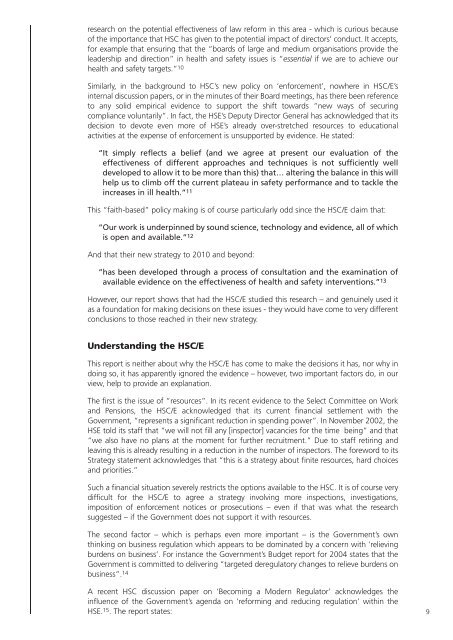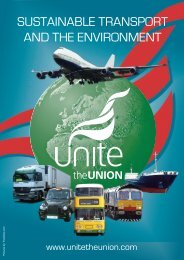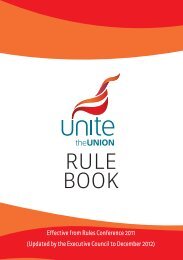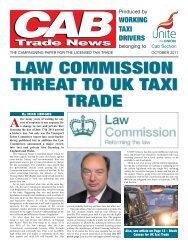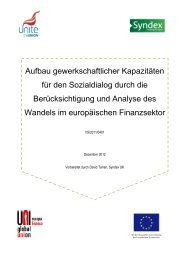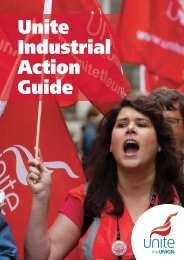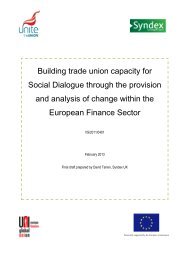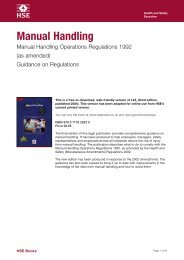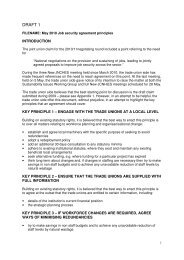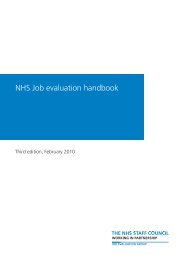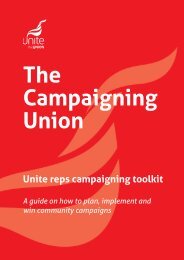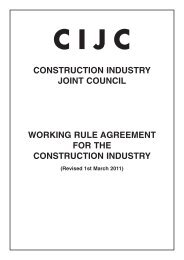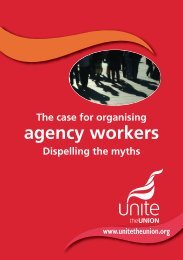Making Companies Safe - what works? (CCA ... - Unite the Union
Making Companies Safe - what works? (CCA ... - Unite the Union
Making Companies Safe - what works? (CCA ... - Unite the Union
You also want an ePaper? Increase the reach of your titles
YUMPU automatically turns print PDFs into web optimized ePapers that Google loves.
esearch on <strong>the</strong> potential effectiveness of law reform in this area - which is curious because<br />
of <strong>the</strong> importance that HSC has given to <strong>the</strong> potential impact of directors’ conduct. It accepts,<br />
for example that ensuring that <strong>the</strong> “boards of large and medium organisations provide <strong>the</strong><br />
leadership and direction” in health and safety issues is “essential if we are to achieve our<br />
health and safety targets.” 10<br />
Similarly, in <strong>the</strong> background to HSC’s new policy on ‘enforcement’, nowhere in HSC/E’s<br />
internal discussion papers, or in <strong>the</strong> minutes of <strong>the</strong>ir Board meetings, has <strong>the</strong>re been reference<br />
to any solid empirical evidence to support <strong>the</strong> shift towards “new ways of securing<br />
compliance voluntarily”. In fact, <strong>the</strong> HSE’s Deputy Director General has acknowledged that its<br />
decision to devote even more of HSE’s already over-stretched resources to educational<br />
activities at <strong>the</strong> expense of enforcement is unsupported by evidence. He stated:<br />
“It simply reflects a belief (and we agree at present our evaluation of <strong>the</strong><br />
effectiveness of different approaches and techniques is not sufficiently well<br />
developed to allow it to be more than this) that… altering <strong>the</strong> balance in this will<br />
help us to climb off <strong>the</strong> current plateau in safety performance and to tackle <strong>the</strong><br />
increases in ill health.” 11<br />
This “faith-based” policy making is of course particularly odd since <strong>the</strong> HSC/E claim that:<br />
“Our work is underpinned by sound science, technology and evidence, all of which<br />
is open and available.” 12<br />
And that <strong>the</strong>ir new strategy to 2010 and beyond:<br />
“has been developed through a process of consultation and <strong>the</strong> examination of<br />
available evidence on <strong>the</strong> effectiveness of health and safety interventions.” 13<br />
However, our report shows that had <strong>the</strong> HSC/E studied this research – and genuinely used it<br />
as a foundation for making decisions on <strong>the</strong>se issues - <strong>the</strong>y would have come to very different<br />
conclusions to those reached in <strong>the</strong>ir new strategy.<br />
Understanding <strong>the</strong> HSC/E<br />
This report is nei<strong>the</strong>r about why <strong>the</strong> HSC/E has come to make <strong>the</strong> decisions it has, nor why in<br />
doing so, it has apparently ignored <strong>the</strong> evidence – however, two important factors do, in our<br />
view, help to provide an explanation.<br />
The first is <strong>the</strong> issue of “resources”. In its recent evidence to <strong>the</strong> Select Committee on Work<br />
and Pensions, <strong>the</strong> HSC/E acknowledged that its current financial settlement with <strong>the</strong><br />
Government, “represents a significant reduction in spending power”. In November 2002, <strong>the</strong><br />
HSE told its staff that “we will not fill any [inspector] vacancies for <strong>the</strong> time being” and that<br />
“we also have no plans at <strong>the</strong> moment for fur<strong>the</strong>r recruitment.” Due to staff retiring and<br />
leaving this is already resulting in a reduction in <strong>the</strong> number of inspectors. The foreword to its<br />
Strategy statement acknowledges that “this is a strategy about finite resources, hard choices<br />
and priorities.”<br />
Such a financial situation severely restricts <strong>the</strong> options available to <strong>the</strong> HSC. It is of course very<br />
difficult for <strong>the</strong> HSC/E to agree a strategy involving more inspections, investigations,<br />
imposition of enforcement notices or prosecutions – even if that was <strong>what</strong> <strong>the</strong> research<br />
suggested – if <strong>the</strong> Government does not support it with resources.<br />
The second factor – which is perhaps even more important – is <strong>the</strong> Government’s own<br />
thinking on business regulation which appears to be dominated by a concern with 'relieving<br />
burdens on business’. For instance <strong>the</strong> Government’s Budget report for 2004 states that <strong>the</strong><br />
Government is committed to delivering “targeted deregulatory changes to relieve burdens on<br />
business”. 14<br />
A recent HSC discussion paper on ‘Becoming a Modern Regulator’ acknowledges <strong>the</strong><br />
influence of <strong>the</strong> Government’s agenda on ‘reforming and reducing regulation’ within <strong>the</strong><br />
HSE. 15 . The report states: 9


